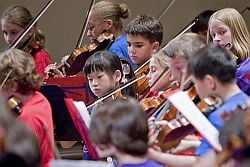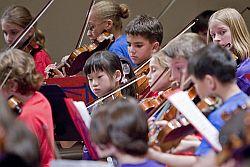
When children play in ensembles, they have individual responsibilities but also share the experience of making music with the other players. The size of the ensemble, whether a duet or small combo, or larger groups like chorus or orchestra, really does not matter. It’s just great for kids to be with other kids who understand the language of music and share a particular musical interest—and who understand the work it has taken to even get to that point. There is a common experience of what a rehearsal is, what practicing means, or what a good or bad performance feels like.
A shared musical experience cuts across language barriers, cultural differences, and socio-economic differences to create community. When it comes down to it, it doesn’t matter where you come from, how long you’ve been playing, or whether you have the best instrument—you are all there to join together to pull off something that requires a common effort, both emotionally and technically. That doesn’t mean that everyone needs to be at the exact same level emotionally, intellectually, and technically, but rather that everyone does need to feel some level of responsibility for themselves and for one another, and be engaged.
Ensembles require children to be open enough to show themselves, open enough to show effort, and open enough to care. Much like a team sports, if everyone doesn’t carry their weight, the outcome is not always successful. There will be ‘stars’ at every level, but even stars need a supporting cast. Good ensemble teachers and coaches can often make ‘losing’ a positive experience for the entire group, especially when everyone has really given their best effort.
For preteens and teenagers, being in an ensemble during this crucial period of development can be an important anchor. An ensemble that is a good fit for a child becomes a safe shared place for them emotionally, and being in music, especially with friends and peers, helps get them ‘to the other side’ as positive, healthy young adults.
Many musical children are marginalized in public and private school settings when the study of music is considered enrichment, and not basic. When music is cut from school programs, students’ abilities to connect and interact with one another with empathy and emotions diminish. Children need to develop in various ways. Being a positive participant in a musical ensemble develops invested “citizens of the world.”

